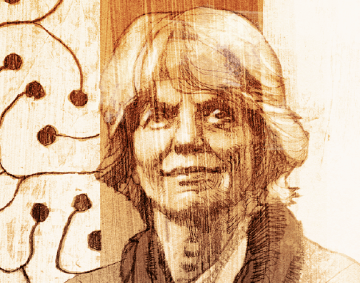Julian Baggini in Prospect:
 The nature of mind and consciousness had been one of the biggest and trickiest issues in philosophy for a century. Neuroscience was developing fast, but most philosophers resisted claims that it was solving the philosophical problems of mind. Scientists who trod on philosophers’ toes were accused of “scientism”: the belief that the only true explanations are scientific explanations and that once you had described the science of a phenomenon there was nothing left to say. Those rare philosophers like the Churchlands, who shared many of the enthusiasms and interest of these scientists, were even more despised. A voice in the head of Patricia Churchland told her how to deal with these often vicious critics: “outlast the bastards.”
The nature of mind and consciousness had been one of the biggest and trickiest issues in philosophy for a century. Neuroscience was developing fast, but most philosophers resisted claims that it was solving the philosophical problems of mind. Scientists who trod on philosophers’ toes were accused of “scientism”: the belief that the only true explanations are scientific explanations and that once you had described the science of a phenomenon there was nothing left to say. Those rare philosophers like the Churchlands, who shared many of the enthusiasms and interest of these scientists, were even more despised. A voice in the head of Patricia Churchland told her how to deal with these often vicious critics: “outlast the bastards.”
Churchland’s work tried to take the philosophical implications of the new brain research seriously without falling into the scientistic traps. It quickly generated a huge amount of interest, from admirers and detractors alike. For her supporters, mostly scientists, studying the brain was essential to understanding how we perceive the world. For her detractors, mostly philosophers, the whole project of “neurophilosophy” was fundamentally naïve and misguided: it was all neuro and no philosophy, reducing humans to mere machines. Churchland still sometimes gets mocked as “the Queen of Neuromania,” as Raymond Tallis acidly described her; Colin McGinn once dismissed her work as “neuroscience cheerleading.”
Yet over the years, Churchland has received due recognition for avoiding the traps that lie in each extreme.
More here.
